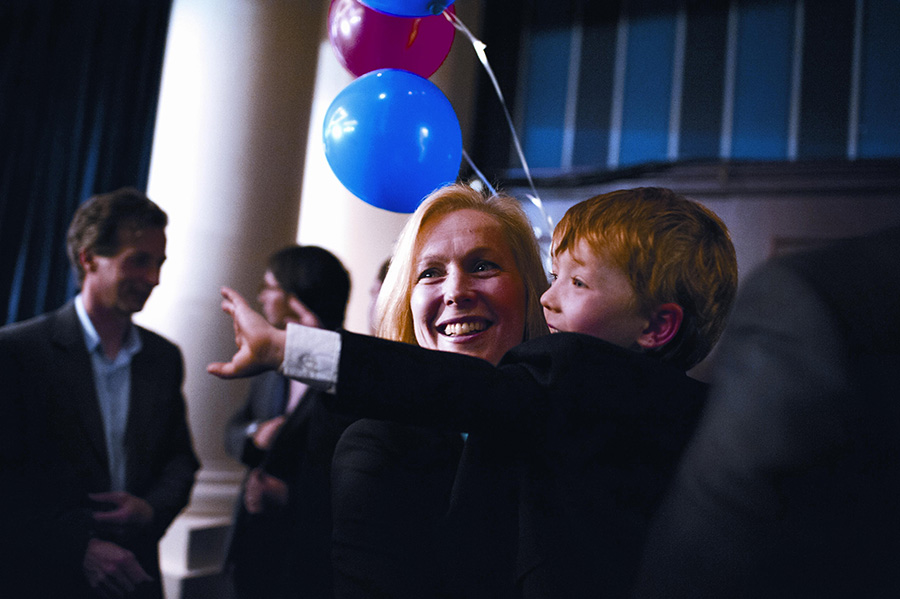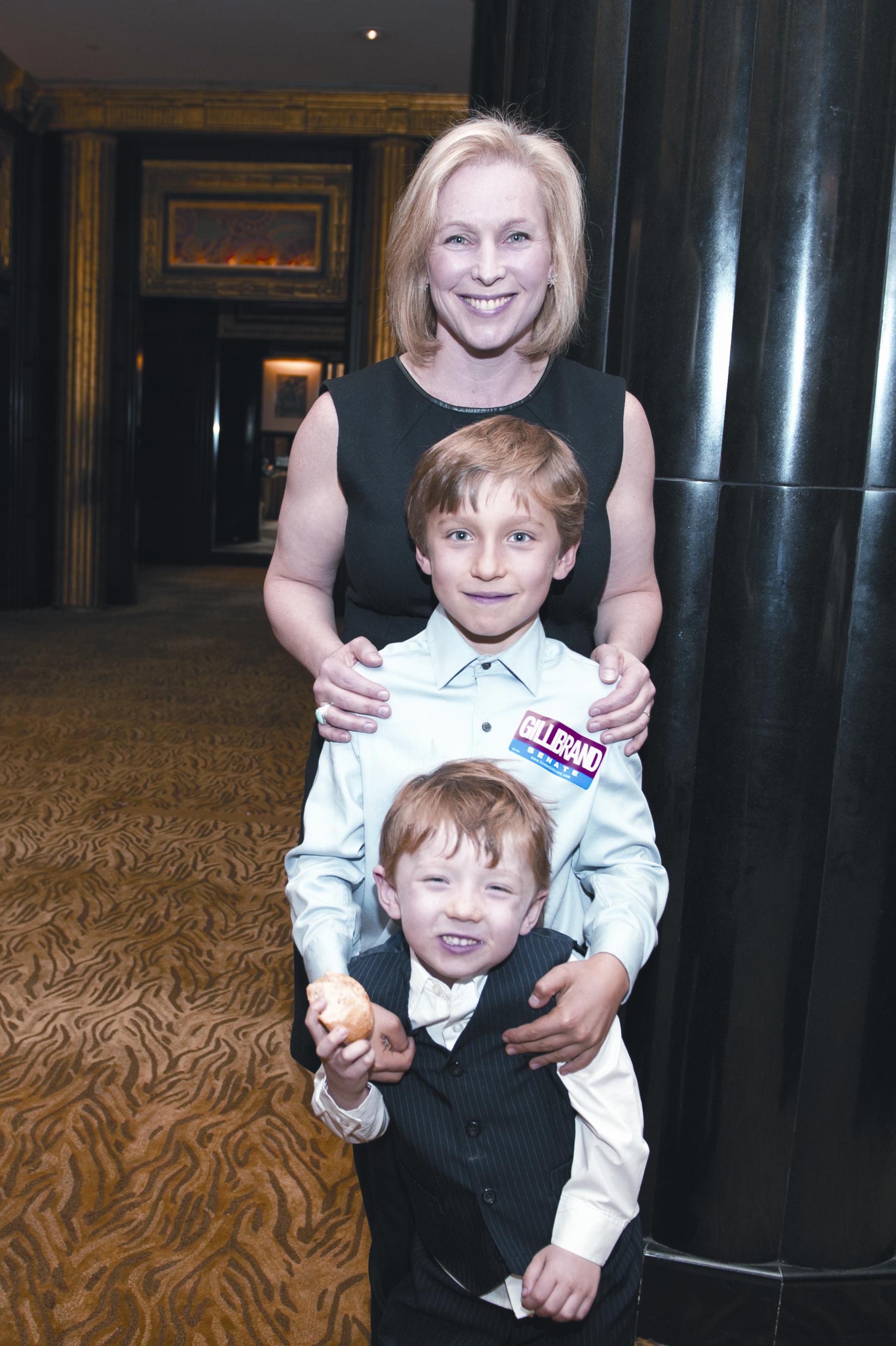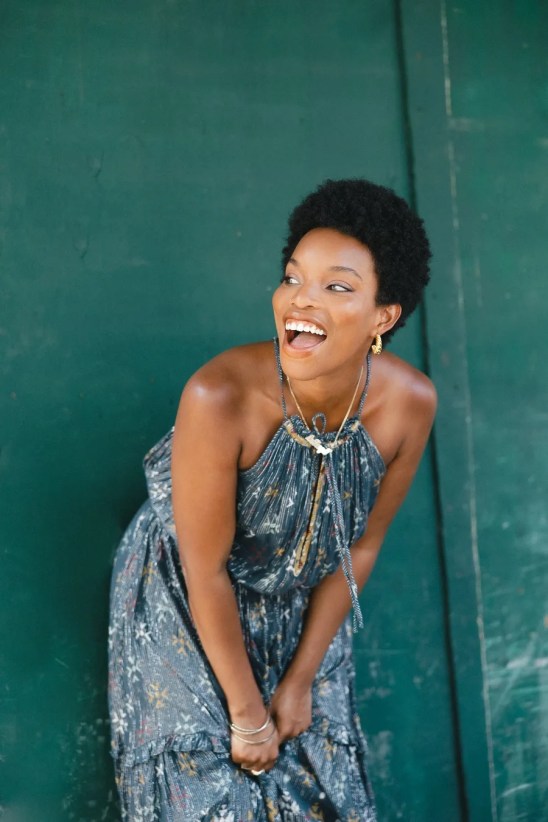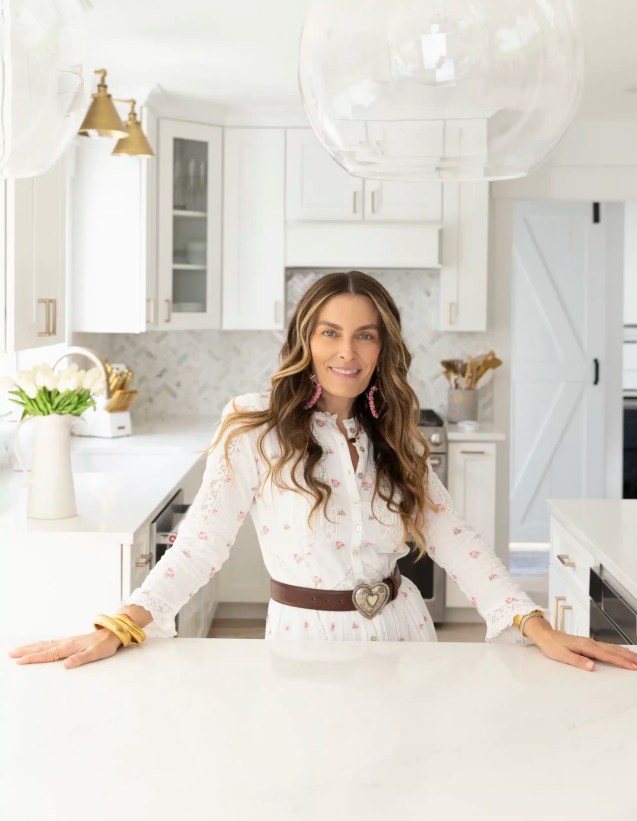
At just 46 years old, Senator Kirsten Gillibrand is one of the most highly accomplished moms in New York. The junior U.S. senator has a daily schedule that would impress even the most overscheduled working parent—and she has the energy and drive to match it. Before giving birth to her second son four years ago, a very pregnant Gillibrand participated in a 13-hour markup session in the House’s Armed Services Committee. That evening, she left the session to a standing ovation on the House floor, wearily returned home, and soon went into labor. The next day, she recovered in the hospital with her newborn, Henry, her husband, venture capitalist Jonathan Gillibrand, and their older son, Theodore.
Before starting a family, the former congresswoman graduated from Dartmouth College and UCLA Law School and was an attorney at a major Manhattan firm. In 2006, after having worked on Hillary Clinton’s U.S. Senate campaign, and also as Special Counsel to Andrew Cuomo in the Department of Housing and Urban Development, she ran for office. Just three years later, Gillibrand was appointed to fill Clinton’s seat in the Senate. Less than two years thereafter, she sealed the deal, winning the special election with 63% of the vote. Fast forward to last year when she did it again, taking a record-breaking 72% of the vote—the greatest margin for any statewide candidate in New York.
As one of only 20 female senators, Gillibrand stands to make incomparable strides on behalf of women across the country. We caught up with the senator in late January to learn about her proudest moments, both personally and politically.
How did you and your husband first meet? You’ve been married for over ten years. What’s family life like right now?
Jonathan and I met in New York City when he was getting his MBA at Columbia and I was a young lawyer at a big law firm, Davis Polk. We were set up on a blind date and we hit it off right away. Jonathan has been a really supportive husband. He really believes in what I’m doing in Washington. He’s always said, “As long as you’re making a difference, as long as you’re helping people, this is something we’re going to do. And the day that you’re not is the day we’re not going to do it!” Throughout the last six years he’s had different jobs and different levels of flexibility. He’s always there for me emotionally when I need encouragement. And he always reminds me why we’re doing this.
Have you found that you and Jonathan generally have similar personalities, or are you different and manage to balance one another in terms of parenting your boys?
We’re very much the yin and the yang. I’m a very encouraging parent. I like to let my children express themselves and explore new things. I’m very much the project-oriented parent who wants to do arts and crafts in the morning, go to a museum in the afternoon, and teach them how to bake something in the evening. I’m very focused on letting them learn by doing. Jonathan is very focused on academics and reading. So we balance each other well in letting our children develop as young people who will hopefully be strong adults with strong character and good integrity.
You have a nine-year-old, Theodore, and a four-year-old, Henry. What are your boys like right now?
Theodore is more introverted. He’s someone who likes computers, who likes building—he’s a bit of an engineer. He has intense friendships that he really enjoys. He’s great at sports—soccer, baseball, taekwondo, squash, tennis. Both Theo and Henry are very good at languages and they both love music. Henry is the extrovert. He loves to go to parties, go out to dinner, meet people. He’s also very good at engineering and building—which both come from my husband.
They both have a great sense of beauty and design. They’re both sensitive boys, very sensitive of other people, but very different in personality. Henry is much more like me and Theo is much more like Jonathan.
What are some of the joys and some of the challenges in raising kids for you right now?
The joys are just watching a child learn how to do something new, watching a child enjoy something that you’re doing together. They are joy-producers, really—children are certainly God’s greatest gift to humanity. I really enjoy watching my children learn and watching them explore and develop into who they’re going to be eventually as adults. The challenges of parenting are focusing [the children’s] efforts into productive activities; making sure they use positive words, not negative words; making sure they encourage each other as opposed to fight with each other. They’re both great eaters, so I don’t have that challenge. Both of my sons eat a lot of fruits and vegetables; they prefer lean meats over fried foods, so I have that going for me.
And what was your own childhood like? Are you recreating that for your children or are you doing things differently?
I had a great role model in my mother. She was a young mom who worked. So I watched how she balanced her work life with parenting, and she did it very gracefully. She would pick us up and then get home and try to make dinner as fast as possible for her starving children! She always managed to put something together in 20 minutes. I’ve learned to do exactly what she did as a parent because I watched her do it my whole life.
One thing I really enjoyed about growing up in upstate New York is that we always played a lot of sports. We learned how to ski and ice skate in the winter; we were always outside. And I want to really instill that in my kids. Even though we’re in Washington, D.C., which is a city, we find places to go that are rural. There’s a beautiful national park called the Arboretum. I take my boys hiking there all the time.
As a mother and a working member of Congress, how do you balance work and family?
I’m incredibly blessed because I can set my own schedule—and a lot of working parents don’t have that ability. I can limit meetings before 9am and between 5 and 7pm. So I can bring my kids to school in the mornings and I can pick them up in the evenings, make dinner, and get them ready for bed. If I have to do an event, I’ll have a sitter come in once they’re all settled and have their pajamas on—so there’s a lot of consistency with our Monday through Friday lifestyle. On the weekends, both Jonathan and I try to take as much time off together as we can so we can have family time.
How, if at all, has having children shaped your political philosophy?
My political life correlated with being a mom. When I was first elected in 2006, Theo was three. So I’ve always had young children around me as a congresswoman and as a senator. It really does inform a lot of the issues that we debate every day. When we’re debating the farm bill, as a mom I was quite incensed that my colleagues wanted to cut money from food stamps, because I can’t imagine how painful it is for a parent to know that their child is going to bed hungry… Being a parent made me that much more sensitive to the trials and tribulations that parents are struggling with during a tough economy.

What do your own children make of the fact that you’re a United States senator? Do they get it?
Henry doesn’t quite understand what I do beyond Mommy tries to help people and represents New York State. But Theo is beginning to understand a little bit more of what my job is. When Hurricane Sandy hit New York State, I had to immediately go and spend endless time there. As a family, we collected books to bring to children who were staying in shelters, and we went through clothes and gave those that didn’t fit to charities. They began to understand that Mommy’s job is to help those families—help them get resources so they can rebuild their homes, help them get resources so they can have a warm place to be at night—and they understood how important it was. I remember one Saturday when I was going to work and Henry said, “Why can’t you stay home?” I said, “I have to go help the families that were hit by Superstorm Sandy.” And he said, “Okay, Mommy. You go help the families!” They’re beginning to understand that I have to help others, and sometimes that means less time with them. But when you put it into a context that they can understand, they’re extremely supportive.
So was it an easy decision to enter politics? What considerations did you need to make as a family?
When I first decided to run for Congress, I ran in a very Republican district, so the likelihood of me winning was very small. Jonathan’s concern was, “I don’t want you to run if there’s no way you’re going to win.” So he was trying to figure out what it would mean to be able to serve in Congress. Once I won my seat, we talked about whether to live together during the week in Washington or if he should care for the children in upstate New York during the week. We decided it was much more important to be together as a family.
Initially, I was just one person on a long list, so I had a long conversation with Jonathan to ask how he’d feel if I submitted my name to be considered by the Governor. He said, “Do you think you could help more people if you were a senator?” I thought about it and said yes, I could because I’d be representing 20 million people, not just 600,000 people. Senators have the ability to really start, stop, or shape the debate on any topic—even junior senators. We made that judgment knowing I’d have greater travel requirements and might be busier than a House member. If I could have a bigger impact, it was worth it.
You’ve supported major legislation to benefit New York families, including more affordable childcare and education; safer drinking water and baby products; stricter gun laws; the list goes on. In your opinion, what is the most important issue of the day for New York families?
The most urgent issue in the state, for every family, is the economy. We have to begin to revive it. Making sure we have Sandy relief is absolutely paramount. We have hundreds of thousands of families who have lost their homes or have had damage to their homes, and we need resources so they can begin to rebuild. We also have to have resources so we can rebuild our infrastructure. That investment in New York is the most important issue because we’re talking about an unemployment rate that’s close to 8%—it’s too high. When a family has a parent who can’t work or who has lost hours, it’s often the kids who suffer. For our families, we need a growing economy. It’s the most urgent issue.
To date, what professional accomplishment are you most proud of?
The greatest moments in my life were giving birth to my two children. The most important part of any life is your family and the people around you who you love. Professionally, I think being elected to a full six-year term and earning 72% of the vote. That was a great honor.
Thinking many years into the future, what do you want your political legacy to be?
That I was a champion for those who don’t have fancy lobbyists in Washington, for the people who feel they’re voiceless in government. There are a number of different constituencies that I care deeply about—from women’s rights and equal pay to affordable daycare and the LGBT community that wants to have children and all of the protections that my family has. That we have real immigration reform in this country where families want to be reunited and want to raise their children—and children who were brought here can become citizens. Those are the families that I fight for every day, families that work hard but still need support. That’s really why I feel like I’m in Washington, to be a voice for them.
I’ve been in the Senate for four years and I’ve managed to pass a few bills that I think really make a difference—and I’ve worked with others to do that. One that I’m very proud of is passing the 9/11 health bill. [It] guarantees that our first responders who were there for us when they raced up the towers while everyone else was coming down, that we can pay for their healthcare.
If you couldn’t be a politician or a lawyer, what would you want to be?
For a long time I wanted to be a preacher. I took Bible study for a long time and I really like the ability to encourage others to be their best and to solve problems. But I decided I had more of a passion for politics ultimately.
How frequently does your family visit New York City? What do you like to do when you’re in the city together?
The last time we were in New York City was election night. It was a great experience for the boys because they got to ride the train, which they love. It was not quite exciting enough for Henry though, because he did fall asleep right as I started speaking! It was a little past his bedtime. But when I started thanking everyone and I said Henry’s name, he perked up immediately and watched the rest of the speech.
To read about the 5 pieces of legislation that Senator Gillibrand would like to pass, click here.






















